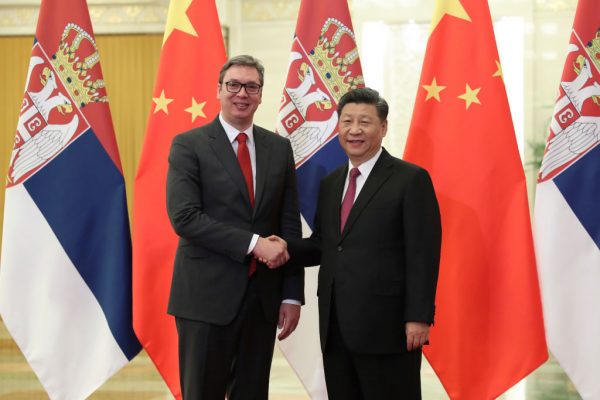The Chinese People’s Liberation Army (PLA) air force flew 12 covert missions to Serbia over the weekend, delivering some of its most sophisticated anti-aircraft systems to the Serbian army.
Serbia, traditionally an ally of Russia, accepted the delivery in what was called a semi-secret operation, raising Western concerns amid the ongoing invasion of Ukraine.
China’s state media reported on April 10 that six PLA Air Force planes landed at Belgrade’s civilian airport early Saturday, April 9, reportedly carrying with them HQ-22 surface-to-air missile systems as well as FK-3 medium-range missiles.
READ MORE:
- EU Parliament Hears Beijing Has a ‘Red Line’ That Russia Should Not Cross
- Russian Invasion of Ukraine Casts an Ominous Shadow Over Taiwan
- China’s Reaction to Biden-Xi Call Exposes Its Fear of International Pressure Amid Russia-Ukraine War
The Chinese cargo planes with military markings on them were pictured at Belgrade’s Nikola Tesla airport on Saturday, although Serbia’s defense ministry did not immediately respond to reporters’ request for comment.
According to Communist Party tabloid The Global Times, the delivery was the biggest overseas airlift involving the Chinese-built Y-20 transport planes and was a great “display of China’s strategic transport capabilities,” the paper said, citing state-linked defense analysts.
Serbia: Weapons deal with China was agreed upon 3 years ago
Success
You are now signed up for our newsletter
Success
Check your email to complete sign up
Serbian President Aleksandar Vucic confirmed the delivery of the medium-range systems that he said were first agreed upon in 2019, telling reporters on April 10 that he would present “the newest pride of the Serbian military” on Tuesday (April 12).
The Chinese missile system has been widely compared to the American Patriot and the Russian S-300 surface-to-air missile systems, although it has a shorter range than the more advanced S-300s. Serbia will be the first operator of the Chinese missiles in Europe.

Vucic had earlier complained that NATO countries, which represent most of Serbia’s neighbors, were refusing to allow the system’s delivery flights into their territories amid tensions over Russia’s aggression on Ukraine.
Although Serbia has voted in favor of U.N. resolutions that condemn Russia’s invasion of Ukraine, it has not joined Western sanctions against the Kremlin or publicly criticized the continuing Russian offensive.
Chinese Foreign Ministry spokesperson Zhao Lijian also told reporters on April 11 that the operation was part of the two countries’ annual cooperation plan, does not target any third parties, and “has nothing to do with the current situation in Ukraine.”
Concerns over a Chinese military buildup
Despite claiming to be neutral in the Russia-Ukraine conflict, Beijing has toed a careful diplomatic line by refusing to publicly condemn its Russian counterpart. In addition, Beijing has been willing to extend a lifeline to Moscow, lifting all restrictions on Russian wheat, and encouraging “peace talks” in order to resolve the conflict in Ukraine.
The apparent arms delivery to Serbia, over the territories of at least two NATO member states, Turkey and Bulgaria, was seen by military analysts as a demonstration of China’s growing global reach.
Mounting fears over the arming of Serbia have intensified as many fear China’s support could encourage the Balkan country to move toward another war — especially against its former province of Kosovo that proclaimed independence in 2008. Serbia, Russia and China don’t recognize Kosovo’s sovereignty, while the United States and most Western countries do.
“The fact that you’re buying your most modern defense system [from China] says a lot about the level of cooperation you expect to have in the future,” Stefan Vladisavljev, a China specialist at the Belgrade Security Forum told the South China Morning Post (SCMP).
Serbia’s NATO standing in question
The arms delivery would also give China a foothold in the European Union’s defense market, Vuk Vuksanovic, an associate specializing in Serbian geopolitics at IDEAS, a foreign policy think tank at the London School of Economics and Political Science, told SCMP.
“China wants to use Serbia in order to penetrate European defense markets,” Vuksanovic said. “Serbia is an EU membership candidate, but is not part of the EU’s legal system, so is quite a useful partner in that regard to test whether Chinese can bypass these obstacles.”
Last month, while campaigning for reelection in the southern city of Vranje, Serbian President Aleksandar Vucic said that Serbia will not join the NATO military alliance and will instead “protect its soil and airspace by itself,” adding that “[Serbia] will protect our children and the future with our own soldiers.”














